Many startups begin wherever their founders are living at the time their brilliant ideas are launched. But what if an entrepreneur were in location flux, looking for a spot to hang a hat and get to work?
Good cities for startups are ones that invest in entrepreneurs through incubators, accelerators and mentor networks. These cities attract not just one startup, but lots of them, creating a community of like-minded strivers.
WalletHub, a credit-score provider and financial services company that provides research reports across a broad spectrum of money-related topics, recently ranked large U.S. cities by how well they support startups.
Using 19 key metrics in three areas—business costs, access to resources and the business environment—WalletHub compared the relative startup opportunities in 100 of the nation’s largest cities.
When looking at business costs, WalletHub considered the affordability of office space, labor costs, corporate taxes and a city's cost of living. When it came to resource access, the company looked at such things as financing accessibility, the prevalence of investors, the working-age population growth and human capital availability.
And finally, as WalletHub considered a city's business environment, it looked at such measures as the five-year business survival rate, startups per capita, the length of an average work week, industry variety and the average growth in the number of small businesses.
Of course, a lot goes into choosing where to launch a startup. Many entrepreneurs take other things into account when figuring out where they hope to launch: their personal social networks, for instance, or where their kids go to school or how close they want to be to aging parents.
But if all else is equal, why not choose based on taxes, office-space affordability and access to talent?
The data for the ranking was collected April 2, 2024, and was provided by the U.S. Census Bureau, the Bureau of Labor Statistics, the Ewing Marion Kauffman Foundation, the National Venture Capital Association, Yelp, Indeed.com, the Tax Foundation, the Council for Community and Economic Research, LoopNet, the Federal Deposit Insurance Corporation, as well as from other WalletHub research.
10. St. Petersburg, Fla.
The first of five Florida cities to make it into the Top 10, St. Petersburg’s position was secured by the city’s landing seventh in the business environment ranking. It also claimed a strong entry as the 19th best city to start a business in terms of business costs.
And it’s a good thing the city’s showing in those two areas was as strong as it was, because when it came to the ranking for access to resourses, St. Petersburg landed a dismal 93rd out of the 100 cities.
Areas of strong development in the Sunshine City include data analytics, financial services, specialized manufacturing, marine and life sciences and creative arts and design, according to the city’s economic development corporation.
In addition, Travel + Leisure named St. Pete as one of the best American cities in which to live.
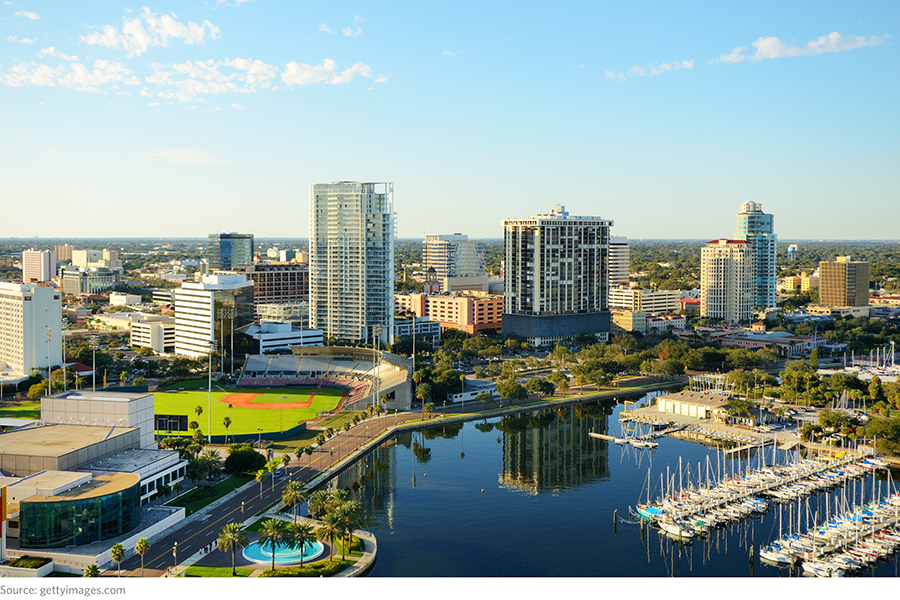
9. Durham, N.C.
One of two North Carolina cities to make it on this list, Durham is part of the Research Triangle region, which includes Raleigh, Durham and Chapel Hill, and it's known for its tech companies, research labs and three Tier 1 research universities—Duke, North Carolina State and the University of North Carolina at Chapel Hill.
Landing in 9th place on this Top 10 list, Durham came in third for access to resources, 21st for business costs and 42nd for its business environment.
Known as the “City of Medicine,” Durham boasts more than 300 medical and health-related companies, according to the city’s website. It also has a vibrant artist community and a rollicking drag scene with four regular shows and five semi-regular shows.
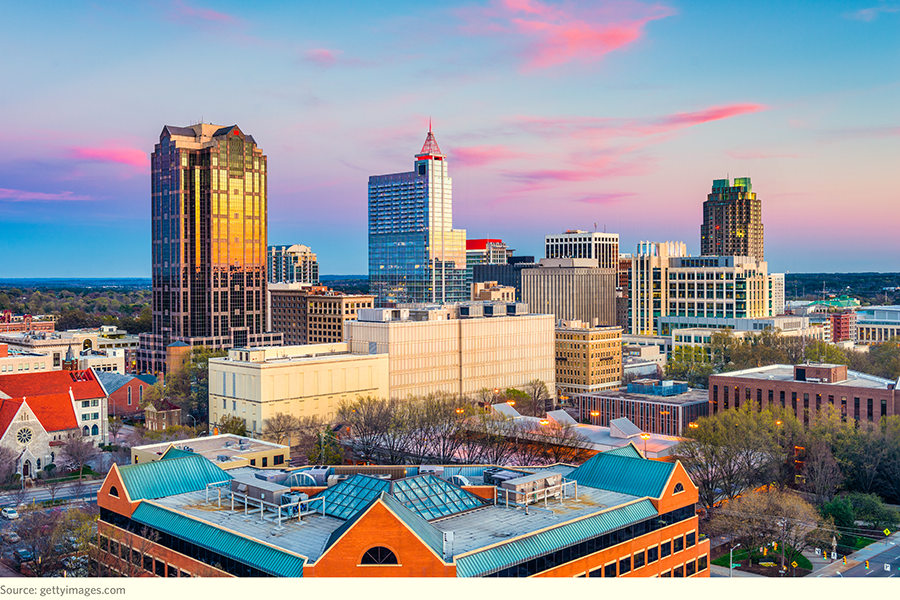
8. Austin, Texas
Appearing in eighth place in the Top 10 is Austin, with its vibrant music scene and the country’s largest urban population of bats, which, from spring to fall, emerge en masse from beneath the Congress Avenue Bridge around sunset.
Austin’s placement on the list was mostly secured by coming in third for its business environment, 17th for access to resources and 81st in business costs.
A center for diversity and creativity in Texas, Austin has successfully developed a startup culture and attracted major businesses such as Google, Indeed and Dell. And according to Develative.com, the valuation of startups within the city boundaries reached a record high of more than $128 billion last year.
More than 25 unicorns have been born in the Austin area, Develative.com reported.
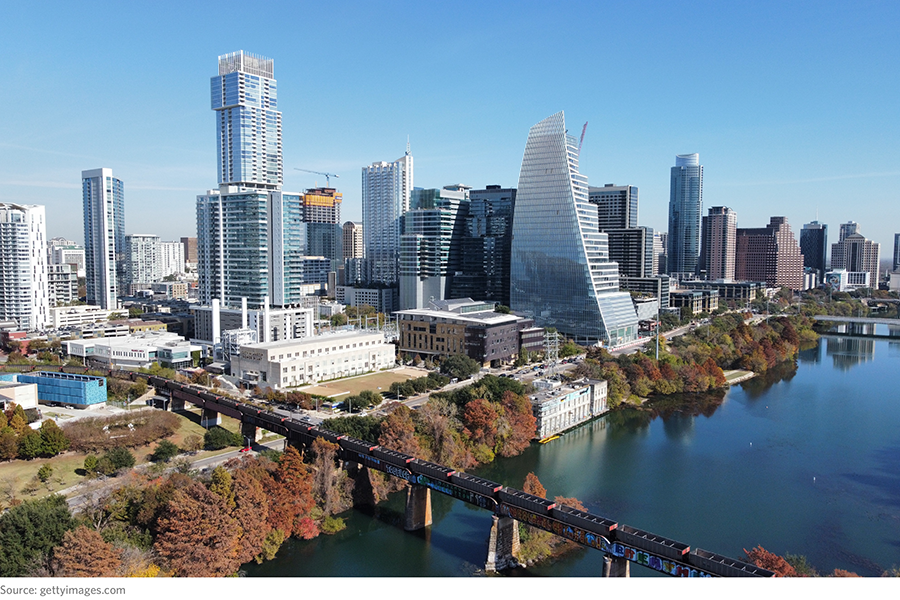
7. Fort Worth, Texas
Fort Worth edged out sister city Austin by just 0.13 in its total scoring on the Top 10 list. Fort Worth landed in eighth place for its business environment, in 18th place for access to resources, and in 66th place for business costs.
Known for its small-town feel but big-city amenities, Fort Worth has affordable living, a strong job market, good colleges and universities, an active art and culture scene, fine dining and outdoor attractions. But it also has heavy traffic, a high crime rate and extreme summer weather.
According to the Fort Worth Economic Development Partnership, the city presents a business-friendly environment with a healthy job market but lower labor and real estate costs than other cities. And the cost of business is 3% lower than the national average when it comes to the tax burden, labor, rent and energy costs.
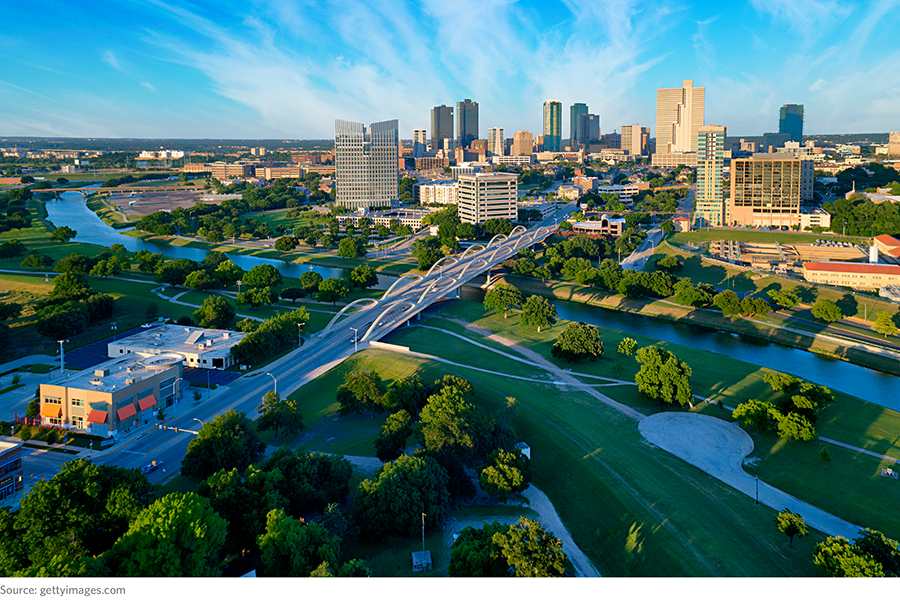
6. Atlanta
Appearing in sixth place is Atlanta, a large, diverse city noted for its low operating costs, large talent pool and mature community of Black entrepreneurs. This city ranked 10th for business environment, 35th for access to resources and 36th for business costs in this Top 10 listing.
According to Massey & Company CPA, Atlanta contains a number of city-incentivized business incubators that provide affordable office space and other resources useful in launching a business, such as mentoring, meeting space and introductions to the business community. The startup scene has been especially strong with medical technology, transportation/logistics and entertainment companies.
And the city has 118 CEOs per 1,000 residents, making it one of the best places to network, said Black Enterprise. The city also has the second-highest number of new business applications—28.5 per 1,000 residents.

5. Miami
Leading off the top five in this Top 10 list is Miami, a city that many believe has established itself as one of the country’s best tech hubs.
Compared with other major metro areas, Miami has a very favorable tax structure. Residents pay no local or state income taxes, while companies pay a 5.5% corporate tax and 7% in state and local sales taxes.
Business startups are heavily supported here, with small business grants of $15,000 for those with five or fewer employees and $35,000 business expense loans for those with between six and 12 employees. And the Florida Small Business Development Center assists businesses with technical assistance, training, introductions and management advice.
In addition, Miami is a world-class transportation hub and has one of the greatest concentrations of national and international banks in the U.S.
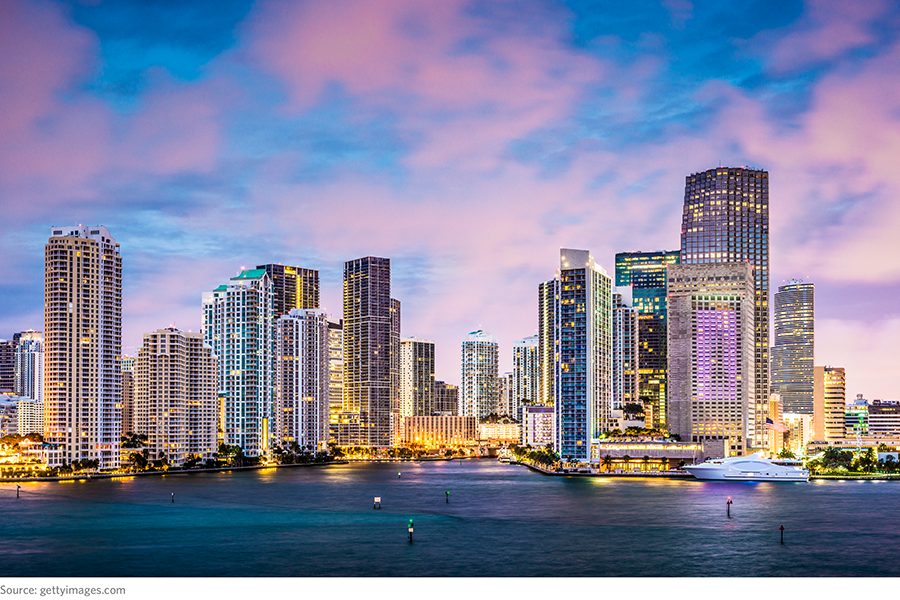
4. Jacksonville, Fla.
Startups looking for a lot of community support may not need to look further than Jacksonville. Appearing in fourth place on this Top 10 list, the city came in fifth for business environment, 13th for business costs and 68th for access to resources.
One major plus for the area is JAX Chamber, a business organization serving more than 3,000 business in all growth cycles. For startups, however, the support can be very meaningful. The Venture Services Division helps entrepreneurs access capital, foster innovation with their fledgling companies and grow talent.
The Bridges entrepreneurship program helps new companies with supply chain diversification. It also helps them further develop business plans and hone strategies through education, teaming and mentoring. And the Women’s Business Center provides additional resources and networking opportunities.
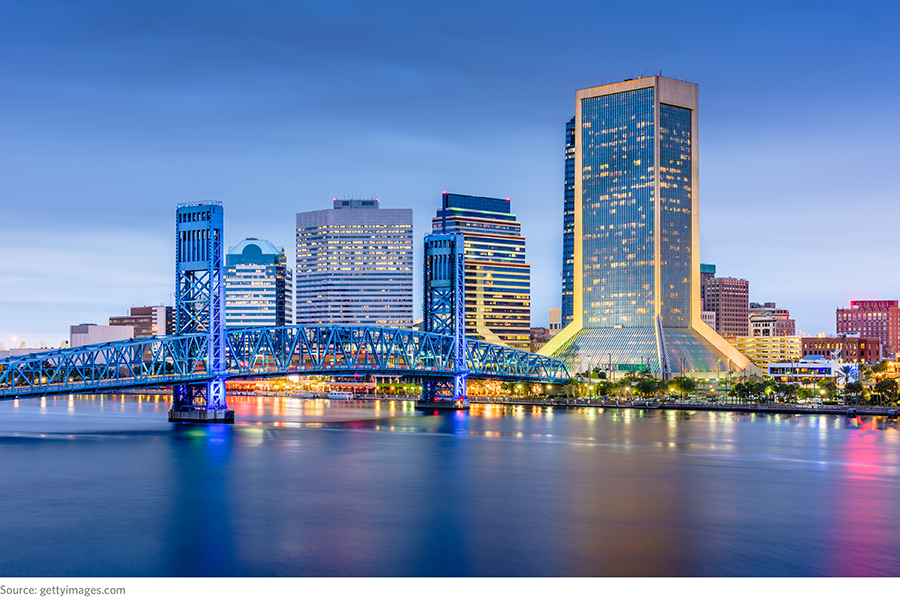
3. Charlotte, N.C.
Long known for hosting financial services, Charlotte has developed a reputation for tech and fintech. Each year, the University of North Carolina at Charlotte supplies these industries with hundreds of graduates holding engineering and IT degrees.
For this Top 10 list, Charlotte lands in third place overall; it's 11th place for the business environment, 20th place for access to resources and 30th for business costs.
The tax rate in North Carolina is extremely business-friendly: There's a 2.50% corporate income tax, a 4.75% state sales tax and a max local sales tax of 2.75%. Add it all together, and global commercial real estate services leader CBRE calculated that a tech startup in Charlotte would cost 42% less than it would in New York City and 24% less than it would in San Francisco.

2. Tampa, Fla.
Holding the No. 2 spot in the list, Tampa boasts a business environment that scored fourth place, while its access to resources is 39th and its business costs are 26th.
Those factors, plus the low corporate tax rate and the fact that there's no state individual income tax, make this Florida city a rapidly growing startup hub, especially for tech. In fact, Forbes considered it the leading emerging U.S. tech city in 2021.
There are also a host of programs designed to support startups in this community. Embarc Collective works with 150 tech startups in Tampa. The Tampa Bay Innovation Center provides networking opportunities and mentors, in addition to business plan services. The First Wave Accelerator program helps startups launch and grow, and it's available until the nascent company earns $1 million in either revenue or investment.
And Relocate Tampa Bay helps new residents settle into the area.
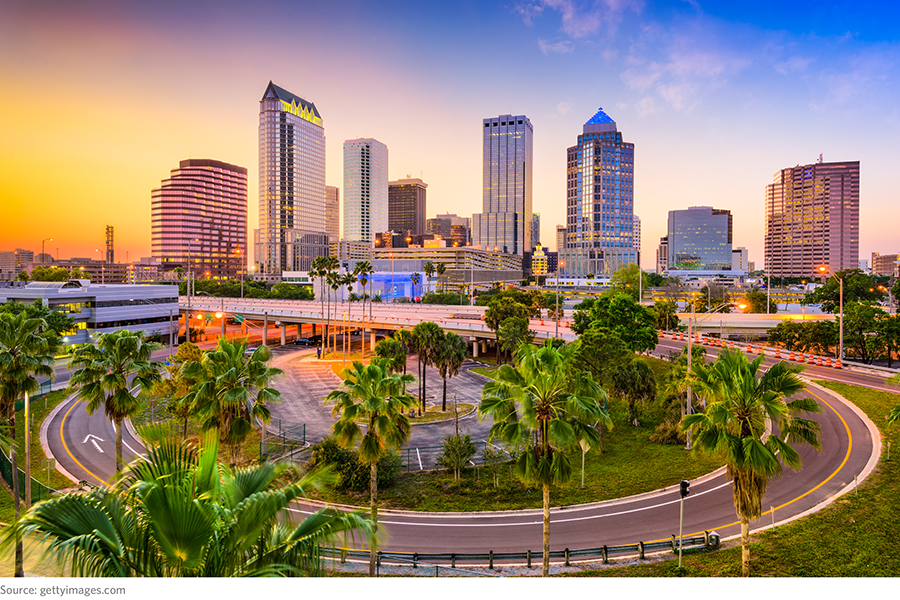
1. Orlando, Fla.
Claiming top honors on the Top 10 list is Orlando, scoring No. 1 in business environment, and coming in 13th for access to resources and 29th for business cost.
A lot more than the House of Mouse, Orlando is one of the top cities listed in the Kauffman Early-Stage Entrepreneurship Index. This means not only that there are a lot of startups in the area, but also that a lot of them live long enough to grow into viable companies.
According to the Top 10 ranking, Orlando also has a very high number of investors per capita, which means viable businesses can find funding in their own backyard.
That, plus an international airport, a growing workforce and easy living with no state personal income tax, solidified Orlando as the No. 1 large city in which to start a business.
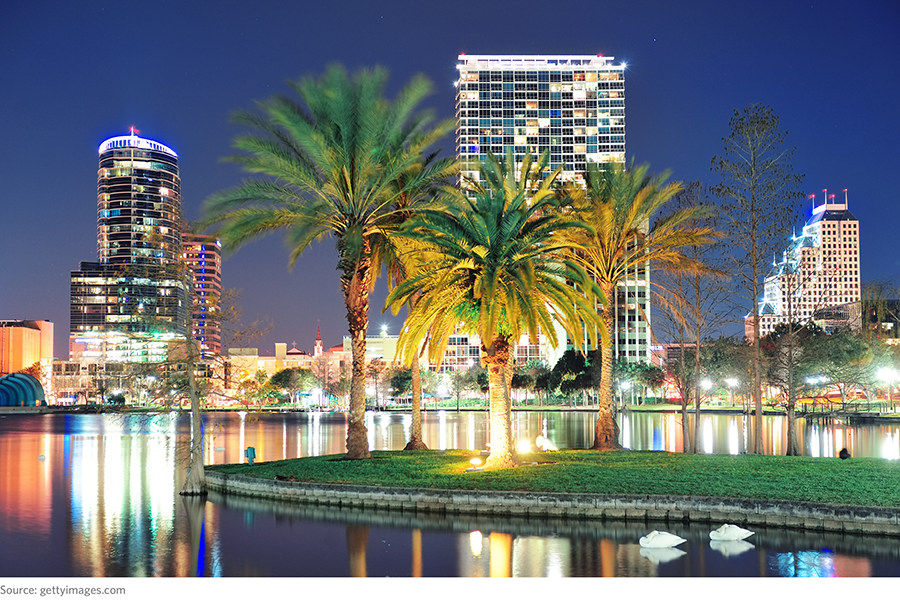
The full report can be viewed here.








